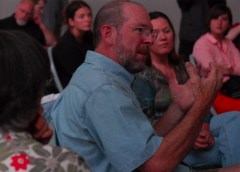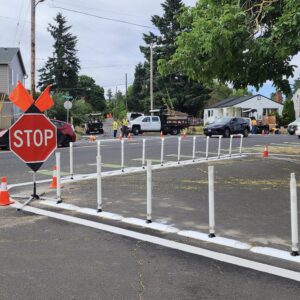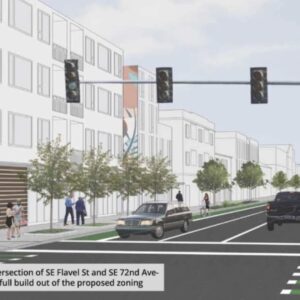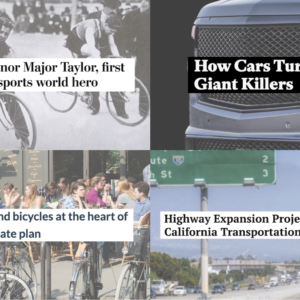Last week I attended the Climate Action Plan Town Hall in North Portland. The event was a chance for Mayor Sam Adams to explain the City’s stance on climate change and to address feedback on the draft version of their plan.
About 50 people gathered in the University Park Community Center. After an introduction by the leader of the Urban League of Portland (where he expressed concerns about a lack of racial equity in the plan), Mayor Adams led attendees through a series of votes. The results were tallied instantly thanks to little clickers passed out prior to the presentation.
One of the questions was, “How do you get around town?” and 30% of respondents said by transit/bike/walk only. Adams told us that was the highest percentage he’d seen anywhere in the city (this was the eighth town hall).
Before getting into the prepared presentation, Adams gave all the climate change naysayers a chance to share their opinions. Several people said climate change isn’t real and that it’s just a natural occurrence. “Al Gore is a fraud!” one of them explained. “‘Smart Growth’ is just a code word for United Nations Agenda 21…look it up on the Internet!” exclaimed another.
Once into the presentation, I paid close attention when they came to the “Land Use and Mobility” section. Michael Armstrong, deputy director of the Bureau of Planning and Sustainability, pointed out that 39% of our greenhouse gas emissions — the largest of any other sources — come from transportation.
To help lower that percentage, the city said they’re committed to density and listed the creation of “vibrant neighborhoods where 90 percent of Portland residents…can easily walk or bike to meet all basic daily, non-work needs,” as one of their 2030 objectives. Neighborhoods are important because, as Adams pointed out, only one-third of Portland transportation trips are work-related.
“Invest in advanced telecommunications infrastructure to enable widespread e-commerce and telecommuting.”
— An action item listed in the plan’s Land Use and Mobility chapter
Other action items in the transportation sphere included funding streetcar development and “first tier” improvements listed in the upcoming update to the Bicycle Master Plan.
Important to meeting their objectives will be to get people out of cars. Their 2030 goal is to reduce per capita vehicle miles traveled by 50% from 2008 levels. One novel way proposed by Adams to get people to drive less is to encourage telecommuting. This is the first I’ve heard of this as an official “action item” from the city, but there it was, listed under “2012 Actions” as, “Invest in advanced telecommunications infrastructure to enable widespread e-commerce and telecommuting.”
Another idea mentioned by Adams was charging people in cars to enter downtown (a.k.a. congestion pricing). The Governor has given Portland a green light to do a pilot program, but even so, Adams brought up the concept carefully, saying it’s an idea first put forward by conservatives in the Bush administration.
The good news for Adams and the City is that Portland is primed for a low-car future. One of the instant voting questions was “How likely are you to switch out some of your car trips with bike or transit?” 68% percent voted “I already do this often,” 32% chose “I could do that,” and no one voted for the “I am unlikely to try that” option.

At the outset of the town hall, Adams asked what questions people wanted answered. An assistant wrote them all down and stuck them on the wall. Then, at the end of the presentation, Adams went back through each question and either addressed it, or tasked a staffer to find out more about it.
Adams’ attention to everyone’s perspectives (whether or not they jibed with his own) on this sometimes controversial issue was appreciated by attendees. Even those who challenged the City’s plan ended up thanking Adams for his handling of the event and the opportunity to speak. The mood was constructive and positive. There were even a few unsolicited rounds of applause and I don’t think anyone left early (which is surprising for a weeknight meeting that went until after 8:30 pm).
There are no more town halls planned, but today is the last day to submit public comments on the plan. You can do so online here.










Thanks for reading.
BikePortland has served this community with independent community journalism since 2005. We rely on subscriptions from readers like you to survive. Your financial support is vital in keeping this valuable resource alive and well.
Please subscribe today to strengthen and expand our work.
Hey, just curious, anybody bring up the CRC?
I think that would be a poor forum in which to bring up CRC – Portland is only one party out of something like 14. The City’s climate plan deals with the city’s response to climate change.
I respect that CRC is a huge issue that needs to be addressed, but it tends to dominate the discussion whenever it’s brought up. If CRC is brought up at every city-sponsored meeting, not only will everyone get sick of hearing about it and tune out the message, but none of the other important issues will get properly addressed.
Looking at the Climate Action Plan, I think there is a lot of really good stuff in there. Of course, a lot of things are sort of first steps, but you can’t just jump to the finish line.
I think congestion pricing would be awesome, as I think a lot of the city would really like to reduce car traffic in downtown (including many of the businesses downtown). With the streetcar and the new max line through downtown, I think it makes it a lot more feasible as well, since there are some non-walking options for pedestrians to get across downtown if they need to.
It’ll be interesting to see how some of this stuff develops (community garden plots replacing parking lots? yes, please!)
My gut feeling on congestion pricing is that it would be classist. It may keep working class people from driving, it may just make it harder for them to survive, and I don’t think it would stop lawyer-mercedes-type drivers. Any thoughts on this? I’m still wrestling with it myself. Also, how would congestion pricing work? Toll booths?
A thought on Congestion pricing… Perhaps have a different price structure based on vehicle occupancy. Single occupant cars pay MORE than double to triple occupant cars. It would help increase ( and actually reward) carpooling and I *suspect* this would be slightly more fair on a class level though not a perfect solution.
I’m not too worried about congestion pricing being classist as long as there are plenty of other options – not just bikes, of course, but mass transit. There is already congestion pricing in the sense that parking in popular areas (downtown) is more expensive than other areas.
Is parking fees how congestion pricing is implemented in a downtown area? It’s not like you can easily have automatic toll scans on every street entering downtown. And a parking tax is a heck of a lot easier to cover a large area.
I went to the first presentation, Sam knows what the goals are and is aware the scale for success is currently skewed. Since the Feds ignored the Climate Change warnings from NASA for years we have some catching up to do, 2030 is too far out to hope for some measure of success. Were talking about the planet not the Willamete River. The auto makers are currently advertising “new” cars that get 23mpg, that should be illegal.
Congestion pricing has been working VERY well in London. I think you buy a permit – daily, annual, whatever – and if you’re found in the city without one you get a big fat ticket. Kind of like a parking pass I guess. People who live within the congestion pricing area receive free permits. Enforcement is supposedly pretty good, at least good enough that the city is raising a little money and traffic downtown has improved a lot.
Portland’s downtown is already SO EASY to access without a car, it’s kind of silly that people don’t do it more. Any plan designed to work for everyone will not work for a few, but I think the benefit with regard to traffic and pollution will greatly outweigh that inconvenience.
They said the day they started the congestion pricing in London, traffic in the center of the city went down 25%.
Plus, the 75% who continue to drive into the center are now contributing revenue to the city, which could be used for all kinds of things, especially in a financial climate like this.
In Portland, I don’t see it being a huge class issue, since it’s so easy to bus/max/bicycle/walk into downtown from all over the city, and do it more cheaply than it would be to drive there even without congestion pricing (not to mention if you have to pay for car parking downtown).
I think this is about as close as it gets to being a good thing for everyone. Of course, it will reduce convenience a bit for some people, but I don’t necessarily think that’s always a bad thing.
Your headline should have read “… young people.”